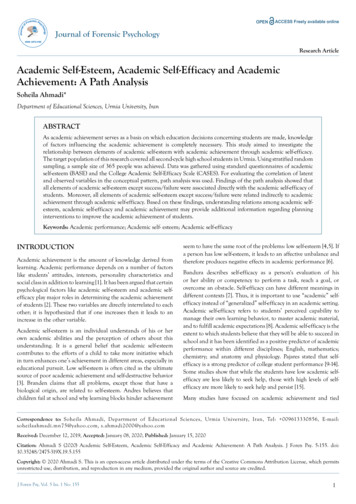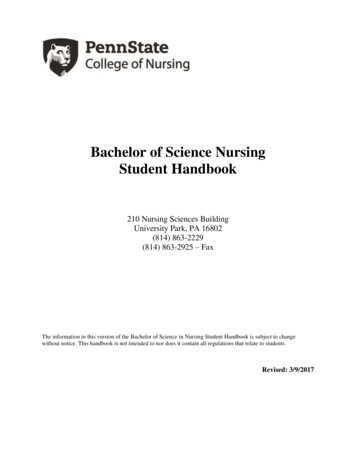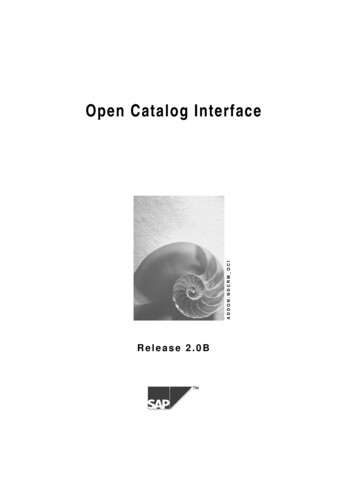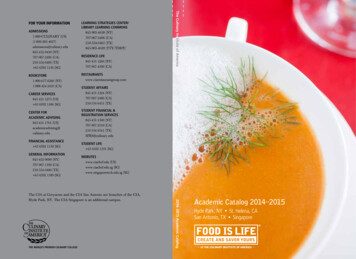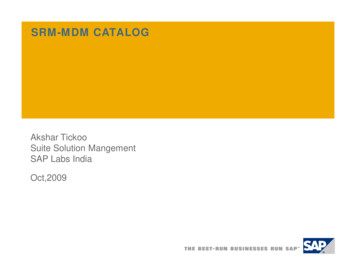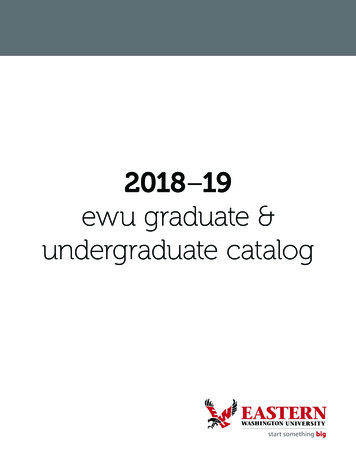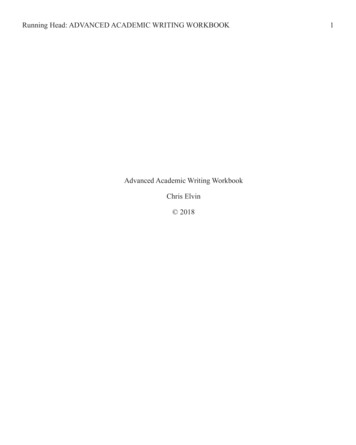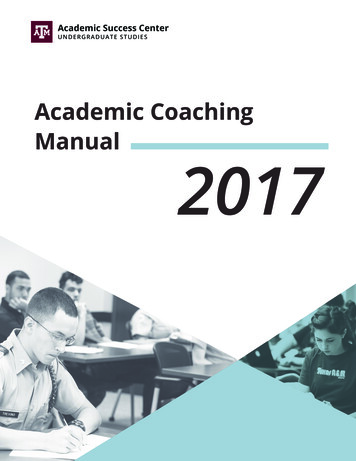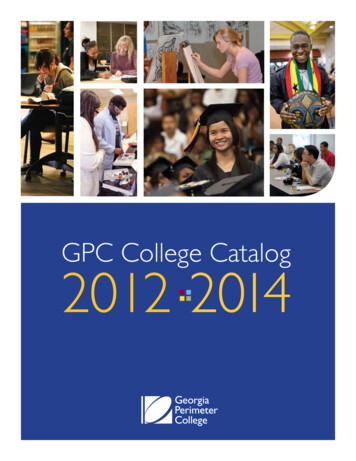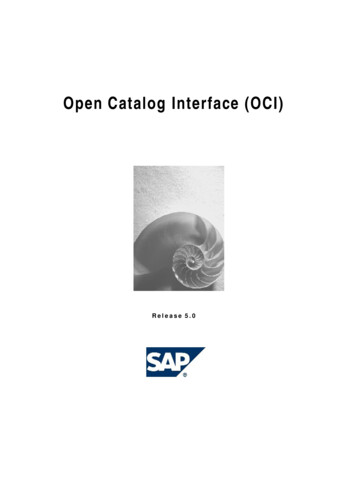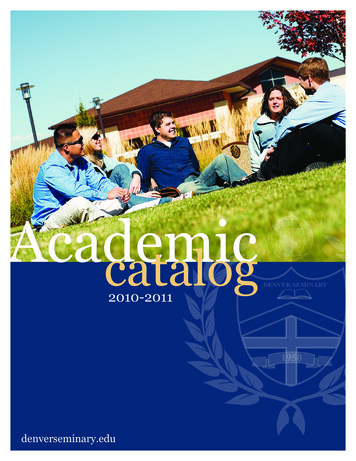
Transcription
Academiccatalog2010-2011denverseminary.edu
ACCREDITATION AND AFFILIATIONSDenver Seminary is accredited by the Higher Learning Commission and a member of the North CentralAssociation, 30 N. LaSalle Street, Suite 2400, Chicago, IL 60602-2504; telephone number800-621-7440; website: www.ncacihe.org, to award master’s and doctoral degrees. The Seminary is alsoan accredited member of the Association of Theological Schools in the United States and Canada,10 Summit Park Drive, Pittsburgh, PA 15275-1103; telephone number 412-788-6505; website:www.ats.edu. The Master of Arts in Counseling degree is also accredited by the Council for Accreditationof Counseling and Related Education Programs (CACREP). Denver Seminary was the first seminary toreceive this accreditation.Note: The Clinical Mental Health Counseling program at Denver Seminary is currently accredited byCACREP under the 2001 Standards for Community Counseling through October 2012. In 2009,CACREP combined the standards for Community Counseling and Mental Health Counseling into Standards for Clinical Mental Health Counseling Programs. Denver Seminary intends to seek accreditation forthe Clinical Mental Health Counseling program when it is scheduled for the reaccreditation process in2012, per CACREP guidelines.Denver Seminary is also a member of the Institute of Theological Studies (ITS).CHANGES TO THIS CATALOGThe Board of Trustees, upon the recommendation of the Seminary administration or faculty, reserves theright to amend or add to any of the regulations governing admission, curriculum, residence requirements,or fees, and to make such changes applicable to accepted applicants or matriculated students. DenverSeminary is not liable for any typographical errors or omissions to this catalog.
A Message from the PresidentThank you for considering Denver Seminary! The purpose of this catalog is to help you better understandwho we are and the mission we believe God has called us to. If you are serious about making a differencein the world for Christ, Denver Seminary can help you do that. We exist to prepare men and women toengage the needs of the world with the redemptive power of the gospel and the life-changing truth ofScripture. Our programs will challenge you to grow intellectually, professionally and personally so thatyou can be more meaningfully involved in God’s purpose and mission in the world.Denver Seminary has been training men and women for ministry for over sixty years and our history provides a foundation for our future. Here you’ll find a community that builds on that foundation with cutting-edge scholarship, innovative programs, and meaningful transformative relationships.At the heart of Denver Seminary, you’ll find five characteristics that will define your experience here:Biblical authority: We believe the Bible is our final authority for faith and practice. We take that belief seriously;looking first to the Word of God as our reference point for all that we teach and do. We affirm unashamedly that theBible provides the only real answers to life’s most profound questions.Vigorous scholarship: As a community of learners, we have the courage to ask tough questions and allow Scriptureto take us to answers that we may not want to face. Vigorous scholarship does not blink when skeptics batter ourconfidence and it does not retreat to the comfortable confines of tried and true axioms. Neither does vigorousscholarship descend into catacombs of academic irrelevance. At Denver Seminary scholarship means exploring theanswers to the questions of real people in the real world.Charitable orthodoxy: Our community comes together around our confession of the great core truths of theChristian faith. Around that common core we engage in gracious and serious conversations about many differentareas of faith and life. Sometimes we disagree with one another on the interpretation of a passage of Scripture or theimplications of a theological truth. At all times, however, we strive to be a community that relates to one anothercharitably with a penchant to listen before speaking and a desire to learn that trumps the instinct to defend and tell.Redemptive relationships: Our community also comes together as humbled and broken people who have found lifeanew in the redemptive power of the gospel. And we live like those for whom redemption, grace, and reconciliationare more than theological concepts—they are the breath of life that sustains us all, every moment of every day. AtDenver Seminary, we nurture interpersonal relationships that drag us out of our hiding places so that we can finallymove into the light of Christ’s searing gaze of love.Global concern: At Denver Seminary, we don’t hide from the realities of a world desperately in need of redemptionat every level. There has never been a generation more globally aware and connected than yours. We will help transform that global awareness into a passion for God’s passion—the redemption of people from every tribe and tongueand nation.Our vision is a world transformed by Christ through the courageous testimony of his people. Whether youwant to train for full-time vocational ministry, deepen your impact as a leader in your church, improveyour testimony in your current profession, or study for personal enrichment, we would love to help you.Come to Denver and be transformed.And by the way . . . our fine campus and the surrounding Rockies are pretty great, too!
Table of ContentsThe Seminary .3Student Life .11Admission Information .15Financial Information .22Financial Aid .25Academic Procedures .31Academic Programs .37Master’s Degree Programs .Graduate Certificates .Certificates of Completion .Doctoral Degree program .41636465Special Programs and Sessions .67Course Descriptions .69Faculty and Administration . 111Index . 134
The SeminaryWELCOME TO DENVER SEMINARYOur world is in desperate need of Christ. Perhaps God is calling you to be a light and to minister to thisrapidly changing and deeply broken world. But where do you begin? How do you respond to that callwith the tools, knowledge, and experiences required to be a competent leader? To be an effective leaderin today’s ever-changing world, Christians must focus on fully comprehending the Bible, living a life ofcharacter and integrity, and leading in an environment that is becoming more global. Denver Seminaryequips you to be that kind of leader, no matter the context to which God calls you.At Denver Seminary, students experience authentic and holistic life change while gaining the knowledgeand insight they need for a lifetime of ministry. Seminary faculty and mentors can help you ascertainyour true calling and guide you to profound personal transformation that extends beyond academics. Ourgraduates are recognized for their outstanding knowledge of Scripture, strong character, competenciessuited to their callings, and leadership skills.So are you called to lead? Has God planted in you the passion and desire to serve and lead his people orone of the unreached people groups in our world? Or has he laid on your heart the desire to attend seminary, but no clear direction yet on what he has in store for you after you graduate? If you can answer yesto any of these questions, we invite you to consider Denver Seminary, where we exist to glorify God byequipping leaders to think biblically, live faithfully, and lead wisely for a lifetime, to see first-hand howyou might fit into this transforming community.Whether you are considering seminary for full-time vocational ministry, to improve your impact as a layleader in your church, or to gain biblical training for your professional, academic or personal development, come to Denver Seminary because you sense God's leading. We stand ready to help you find yourGod-given giftedness, fulfill your call in His Kingdom and increase your ability to impact our world.When asked why theological training was necessary, Denver Seminary Chancellor Dr. Vernon C.Grounds noted the following: “It was Abraham Kuyper, the noted reformed theologian and one-timepremier of the Netherlands, who declared that as Christians we must claim every inch of our world forJesus Christ. He must be sovereign not only in the church but in education, government, business, politics, science, academia, the arts—indeed all spheres of human activity. But that means biblical truths andprinciples must be known and prayerfully applied. And that’s why a seminary education gives a solidfoundation for effective service in our world.”VISITING THE DENVER SEMINARY CAMPUSProspective students are welcomed and encouraged to visit the campus. With some advance notice, arrangements can be made with the Admissions Office for visits with faculty members, class attendance,and lodging, if needed.Denver Seminary is located in the southwestern part of the greater Denver area, situated on Santa FeDrive in the city of Littleton.Address: 6399 S. Santa Fe Dr., Littleton, CO 80120Phone: 303-761-2482 or 800-922-3040Fax: 303-761-8060Web: www.denverseminary.eduEmail: info@denverseminary.edu3
A HISTORY OF DENVER SEMINARYDenver Seminary of Denver, Colorado, began in the minds of several Colorado Conservative Baptistpastors who presented the idea at the annual meeting of the Conservative Baptist Association of Coloradoin May, 1950. In response, the association formed an organizing committee of Conservative Baptist leaders. In the ensuing months, these men secured an adequate building for the new school and led in the selection of the first faculty and board of trustees. After promotion began, inquiries came from a number ofprospective students. In September 1950, thirty-one students enrolled.The next year marked the coming of Dr. Carey S. Thomas as president and Dr. Vernon C. Grounds asdean. In a relatively short time the school obtained governmental approval for education under the G.I.Bill. This was followed by approval for the training of foreign students and later by governmental recognition for the education of chaplains. The first graduating class (1952) consisted of six members, all ofwhom had transferred to Denver from other schools.In 1955, a new administrative arrangement was initiated with Vernon C. Grounds as president,Douglas V. Birk as administrative vice president, and Earl S. Kalland as dean. In the late 1950s severalprofessors joined the growing faculty and the first of a series of additional buildings was secured in theneighborhood of the original administration and classroom building. By the mid-1960s the faculty numbered ten full-time professors, twelve buildings stood on the campus, and library volumes numbered27,000.In June 1962, Denver Seminary was granted associate membership in the American Association ofTheological Schools (now the Association of Theological Schools). Shortly thereafter, a major study ofthe curriculum resulted in changes embodied in the academic catalog of 1965–67. Other standards of theaccrediting association were met, but an adequate library building remained only in the planning stages.In the summer of 1968, however, the school relocated to the south side of Denver. Purchasing twelveacres of ground and four buildings previously owned by the Kent Girls’ School, the Seminary was able toconvert the gymnasium into an attractive library equipped to house at least 80,000 volumes. The following year three apartment buildings were erected on the grounds which provided eighty student housingunits.In 1971, full accreditation by the Association of Theological Schools (ATS) was achieved. This was followed by full accreditation under the North Central Association of Colleges and Secondary Schools in1972.In 1979, Dr. Haddon W. Robinson followed Dr. Grounds as the third president of the institution. Underhis leadership, the Seminary continued to expand; faculty increased to twenty-two full-time and twentyfive adjunct professors. Five of the seven administrators received faculty status and the staff increased tosixty people. By 1992, the student body numbered over 600 and came from forty states, fifty-three denominations, and fifteen countries.Dr. Edward L. Hayes assumed leadership of Denver Seminary in 1993, becoming its fourth president,having previously served as academic dean and professor of Christian education. Under Dr. Hayes’ leadership, Denver Seminary was positioned to meet the spiritual and technological challenges of thetwenty-first century. Dr. Hayes retired in December 1996, having served Denver Seminary with distinction for a total of twenty-three years.4
In 1996, Dr. Clyde McDowell was named Denver Seminary’s fifth president. Of special interest to Dr.McDowell was the revitalization of the inner-city churches of all ethnic backgrounds. Dr. McDowell ledDenver Seminary to reinvent its approach to seminary education by incorporating an intensive, contextualized mentoring experience into its core curriculum. His presidency ended with his death from a braintumor.In 1999, the board of trustees appointed Dr. Leith Anderson as interim president of Denver Seminary.The Board appointed Dr. G. Craig Williford as Denver Seminary’s sixth president in August 2000. Dr.Williford’s desire to integrate theory and practice helped the Seminary continue to develop and expandthe training and mentoring program which has become an essential part of a Denver Seminary education.Under his leadership, the student body grew to around 900 students, and the institution realized a level ofeconomic health not experienced in previous years.In July 2005, Denver Seminary relocated to a beautiful, new and debt-free campus situated next to thePlatte River in Littleton, Colorado. Built specifically for the Seminary, the campus features three buildings: an academic center; a learning resource center, which is home to the library with over 175,000books and bound periodicals, the bookstore, and the student center; and an administrative building withoffices for faculty and staff, plus the Shepherd’s Gate Counseling Center.In 2008, the Board of Trustees appointed Pastor Gordon MacDonald as interim president of DenverSeminary.In March 2009, Dr. Mark S. Young was elected the seventh president by the Board of Trustees. Dr.Young brings to Denver Seminary extensive experience as an international educator and theologian, aswell as an abiding commitment to mission and transformation. His life’s passion is to align all that he isand all that he does with the eternal purpose of God—the redemption of all peoples.Today, almost 5,000 graduates of Denver Seminary serve Christ throughout the world. Thus the dream ofa group of pastors is now a vibrant reality and a significant factor in reaching the world for Christthrough the power of the Holy Spirit.DENVER AREA INFORMATIONHistory of DenverDenver, the Mile High City, was founded on the site of a small Indian village at the confluence of CherryCreek and the South Platte River. Originally a trade center for mountain mining camps of the 1859 goldrush, the town persevered despite flash floods, attacks of Plains Indians, and a devastating fire anddrought. Early settlers and current Denver residents alike have enjoyed their location on the high plainsat the foot of the spectacular Rocky Mountains. The Colorado History Museum, located in downtownDenver, and other sites in mountain towns such as Central City, contribute to keeping Colorado’s colorful past alive.WeatherAt 5,280 feet above sea level, the city has a mild, sunny, semi-arid climate with moderate temperatures.Colorado boasts more than 300 days of sunshine each year and its winters afford many opportunities forskiing, sledding, and other winter sports.5
CultureDiverse cultural opportunities are reflected in the Museum of Nature and Science, the striking, six-storyDenver Art Museum, including the Frederic C. Hamilton addition which opened in 2006, and the DenverCenter for the Performing Arts, which hosts the Denver Center Theatre Company, a nonprofit regionalrepertory company, and the Colorado Symphony Orchestra. The orchestra offers several concerts peryear, as well as the popular Symphony in the Park during the summer. Music lovers will also enjoy summer concerts in the Red Rocks Park outdoor amphitheater in the foothills of the Rockies or closer to theSeminary at Fiddler’s Green in Englewood.The Denver Zoo participates in a number of conservation programs designed to ensure the long-term survival of rare and endangered species worldwide and is home to over 2,500 animals. The TropicalDiscovery exhibit features a diversity of animal and plant life in its tropical rain forest environment. Itincludes a mountain cave, tropical streams and waterfalls, temple ruins, a jungle river, swamps, and anoffshore coral reef.The Downtown Aquarium, a world-class facility, is located in Denver's Central Platte Valley. Thisunique tourist attraction immerses visitors in the wonders of water on two journeys—from theContinental Divide in Colorado to Mexico's Sea of Cortez and from an Indonesian rain forest to thePacific Ocean. Its mission is to create experiences that inspire its guests to discover, explore, enjoy, andprotect our aquatic world.Among Denver’s professional sports teams are the 1998/99 NFL Super Bowl Champion Denver Broncos,the NBA Denver Nuggets, the MLB Colorado Rockies, the 2001 NHL Stanley Cup-winning ColoradoAvalanche, the NSL Colorado Rapids, and the NLL Colorado Mammoth.Area Educational InstitutionsOpportunities for undergraduate, graduate, and post-graduate education are numerous. The University ofDenver campus is approximately six miles north and east of the Seminary. Colorado Christian Universityis located in Lakewood, approximately one-half hour from the Seminary. Downtown, the Auraria campushouses the Metropolitan State College, Denver Community College, and the Denver branch of theUniversity of Colorado. The main campus for the University of Colorado in Boulder is an hour away andColorado State University in Fort Collins and the University of Northern Colorado in Greeley are lessthan two hours away from the Seminary.Outside DenverDenver serves as the gateway to the magnificent Rocky Mountains. West of the city, more than fiftypeaks rise over 14,000 feet into the sky. Skiing, hiking, fishing, camping, and hunting are little more thanan hour’s drive from the Seminary campus. The twenty-seven mountain parks maintained by the city ofDenver include some of the most scenic areas of the Colorado Rockies.For the more adventuresome, white-water r
Denver Seminary was the first seminary to receive this accreditation. Note: The Clinical Mental Health Counseling program at Denver Seminary is currently accredited by CACREP under the 2001 Standards for Community Counseling through October 2012. In 2009, CACREP combined the standards for Com
